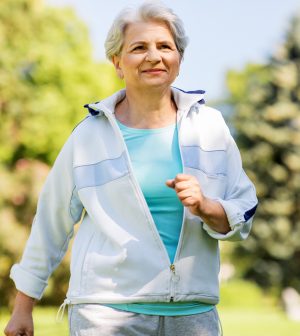- Could Your Grocery Store Meat Be Causing Recurring UTIs?
- Are You Making This Expensive Thermostat Error This Winter?
- Recognizing the Signs of Hypothyroidism
- 10 Strategies to Overcome Insomnia
- Could Artificial Sweeteners Be Aging the Brain Faster?
- Techniques for Soothing Your Nervous System
- Does the Water in Your House Smell Funny? Here’s Why
- Can a Daily Dose of Apple Cider Vinegar Actually Aid Weight Loss?
- 6 Health Beverages That Can Actually Spike Your Blood Sugar
- Treatment Options for Social Anxiety Disorder
Walking, Jogging, Yoga Are All Good Medicine for Depression

Looking for a workout that will chase the blues away?
Try walking, jogging, yoga or strength training, which a new study reports are the most effective exercises for easing depression. These activities can be used on their own or combined with medication and psychotherapy, according to an evidence review published Feb. 14 in the BMJ.
While low-intensity activities like walking and yoga are OK, the more vigorous the activity, the bigger the benefits, the Australian-led team found.
The World Health Organization estimates that more than 300 million people worldwide have depression. While exercise is often recommended, treatment guidelines and previous research differ on the best ways to prescribe it for depression.
To learn more, researchers in Australia and Europe looked at 218 randomized trials that compared exercise with other depression treatments. The studies included more than 14,100 participants.
They found meaningful benefits when exercise was combined with SSRI antidepressants or psychotherapy, suggesting that working out could be beneficial alongside these established treatments.
Researchers reported large reductions in depression for dance and moderate reductions for walking or jogging, yoga, strength training, mixed aerobic exercises and tai chi or qigong.
While walking or jogging helped both men and women, women benefited more from strength training and men from yoga or qigong, the study found. Yoga was more effective in older people, while strength training worked best among the young.
Researchers said exercise appeared equally effective for folks with and without other health conditions and with different levels of depression. Working out alone or in a group had similar benefits.
“Our findings support the inclusion of exercise as part of clinical practice guidelines for depression, particularly vigorous intensity exercise,” the authors said in a journal news release.
Lead author of the study is Michael Noetel, a lecturer in the school of psychology at the University of Queensland in Australia.
In an accompanying editorial, Juan Ángel Bellón, of the University of Malaga in Spain, wrote: “Primary care clinicians can now recommend exercise, psychotherapy, or antidepressants as standalone alternatives for adults with mild or moderate depression.”
But, he said regular exercise can be challenging for folks with depression and further study is needed to evaluate physical activity programs for people with depression.
More information
The Mayo Clinic has more about the role of exercise in easing depression and anxiety.
SOURCE: BMJ, news release, Feb. 14, 2024
Source: HealthDay
Copyright © 2026 HealthDay. All rights reserved.










